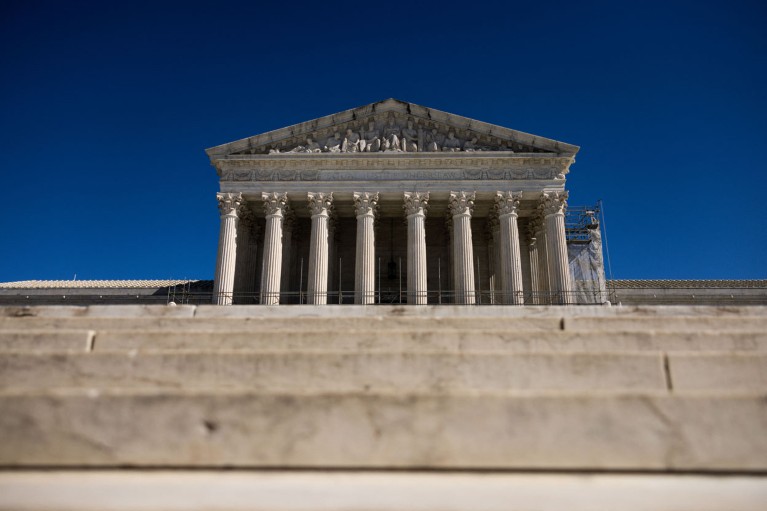
Lawsuits against the US National Institutes of Health might end up at the Supreme Court.Credit: Tierney L Cross/AFP/Getty
Threats to US biomedical research grants are coming thick and fast — and so are the lawsuits.
Since US President Donald Trump took office in January, the US National Institutes of Health (NIH), based in Bethesda, Maryland, has cancelled hundreds of grants, delayed the award of new ones and tried to slash the money awarded for ‘indirect’ research costs. But researchers are not just rolling over. Scientific bodies, academics and state attorneys have so far filed five lawsuits directed primarily against the NIH and its parent body, the US Department of Health and Human Services (HHS), including two suits launched last week.
Here, Nature unravels the legal claims and sets out what is likely to happen next. Andrew Nixon, an HHS spokesperson, told Nature that the department does not comment on pending litigation. The NIH and the White House did not respond to enquiries.
Why have NIH grants been affected, and how?
On 20 January, Trump issued an executive order directing every US agency (which includes the NIH) to “terminate, to the maximum extent allowed by law” all grants relating to diversity, equity and inclusion (DEI). In February, a court found parts of this order to be unconstitutional and issued an injunction against it. But in March, a court of appeal suspended that injunction while the government appeals the court’s ruling, meaning that, for now, Trump’s order stands.

NIH turmoil sparks anxiety over future of its global grants
In the wake of this and other federal guidance, almost 800 NIH grants awarded previously have been terminated. Many are DEI-related, such as grants for studies on how to address health inequities. But others cover research on subjects including vaccine hesitancy, COVID-19 and the health effects of climate change.
At the same time, researchers are finding it is taking longer for new NIH grant applications to be processed. A legal complaint filed on 4 April by 16 US states says that the NIH and 25 of its subsidiary centres and institutes have held about 770 study-section meetings — the first layer of their grant review process — in the 2025 fiscal year so far, just half of the historical average for this timeframe.
On 7 February, the NIH announced a policy that would have cut billions of dollars from payments made annually to US research institutions. The policy capped ‘indirect cost’ payments, which cover expenses such as facilities maintenance, utilities and support staff, at 15% of a grant’s value. Since 2009, the average indirect cost rate has been 27–28%, and for some institutions has exceeded 60%.
What lawsuits have been launched in response?
On 10 February, various plaintiffs, including academic institutions, non-profit groups and 22 state attorneys — who act as a state’s legal representative — filed three separate suits over the indirect costs policy (see ‘Lawsuits against the NIH’). On 4 April, a federal judge who heard all three suits permanently blocked implementation of the cap. The NIH is now appealing that decision.
Two suits against the NIH and the HHS address the cancellation of grants. One was filed on 2 April by plaintiffs including the American Public Health Association and four individual researchers. “People should have the freedom to explore the questions that they believe have public-health significance and not to be dictated by somebody’s political attitudes,” says Peter Lurie, a plaintiff and a research physician at the Center for Science in the Public Interest in Washington DC.
On 4 April, 16 US states filed a similar suit over the termination of already-awarded grants. This complaint also covers the increased delays in reviewing new grant applications.
The NIH and HHS have also been named as defendants alongside the US Department of Justice and other bodies in a suit regarding the cancellation of grants and funding at Columbia University in New York City.
What are the legal arguments made in the cases against the NIH?
All five cases make arguments based on the Administrative Procedure Act (APA), a 1946 statute that governs how federal administrative bodies establish regulations. The complaints argue that the NIH’s actions have been “arbitrary and capricious” rather than following normal procedures.

US universities curtail PhD admissions amid Trump science funding cuts
The NIH does have a policy for cancelling grants that have already been awarded, but in the past cancellations were rare and were usually spurred by concerns about fraud or imminent harm to the public, Lurie says. The lawsuits argue that this year’s rash of cancellations did not follow the agencyўs own regulations. Moreover, the APA states that “within a reasonable time, each agency shall proceed to conclude a matter presented to it”. The 4 April complaint argues that the delays in processing NIH grant applications violate this stipulation.
Other arguments are constitutional. For example, the 2 April suit argues that the government’s directive apparently disregards Congress’s “express mandate that NIH fund research to address health equity and health disparities”. This, they argue, breaches the constitutional concept of separation of powers. “Congress has told the agency what it needs to do, and the executive branch has taken that over. That’s unconstitutional,” says Shalini Agarwal, part of the legal team that filed this suit and a member of the Protect Democracy Project, a non-profit group based in Washington DC.


